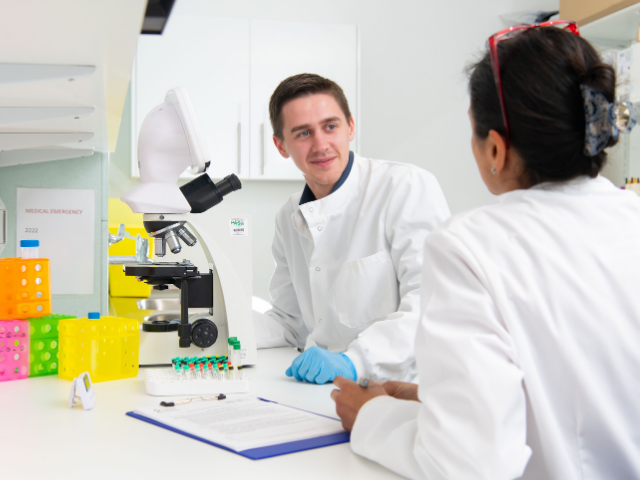
Wales’ life-changing rare disease research
A rare disease is one that affects fewer than 1 in 2000 people. One hundred and seventy-five thousand people in Wales will be affected by a rare disease at some point in their lives. There are over 6,000 rare diseases, more than 70% of which are genetic in origin.
Undertaking research in this area is key to unlocking scientific knowledge and understanding of rare diseases, which can improve diagnoses for those affected.
Wales Gene Park, funded by Health and Care Research Wales, supports rare disease research in Wales. Researchers study diseases such as the inherited tumour syndromes; familial polyposis, which affects the colon, and Tuberous Sclerosis, a disease that causes mainly non-cancerous tumours to develop around the body.
Research being undertaken by the Inherited Tumour Syndromes Research Group as part of Wales Gene Park (Cardiff University Division of Cancer and Genetics, School of Medicine) is leading to a better understanding of the underlying genetic causes of these conditions. Those involved in the research are: Dr Sunil Dolwani, Dr Laura Thomas, Dr Hannah West, Nicola Lander, Becky Truscott, Angharad Walters and Professor Julian Sampson.
In Genetic Alliance’s recent report Rare Experiences 2020, which surveyed over 1,000 people affected by genetic, rare and undiagnosed conditions, respondents talk about the importance of research into rare conditions, saying “Research is necessary and essential to understand/learn more of the disease”.
Through Health and Care Research Wales funding, Wales Gene Park’s Research Coordinator Loys Richards oversees the requirements associated with research studies looking for genetic factors behind several inherited cancer syndromes. Currently there are five research studies open to recruitment:
Genetic mechanisms in polyposis of the bowel
This is a UK-wide study looking into new genetic ways by which small growths called polyps and tumours can develop in the bowel in certain inherited cancer syndromes, and highlights the potential usefulness of expanding diagnostic screening.
Molecular genetic analysis of duodenal polyposis in the inherited colorectal adenoma and cancer predisposition syndromes (Familial Adenomatous Polyposis and MUTYH-Associated Polyposis)
Patients with the rare inherited tumour syndromes FAP (familial adenomatous polyposis) and MAP (MUTYH associated polyposis) are also at risk of developing tumours in a part of the small intestine called the duodenum as well as the colorectum. This study investigates the genetic factors linked to this.
Exploring genetic causes of duodenal polyposis using healthy volunteers
This study uses 3D organoid, a miniaturised and simplified version of an organ, models to explore the genetic causes of how polyps in part of the small intestine can develop in patients with FAP and MAP by comparing them with healthy volunteers.
A prospective Europe-wide study of duodenal disease in MUTYH - Associated Adenomatous Polyposis (MAP)
This first multi-centre European prospective study of duodenal disease which affects a part of the small intestine in MAP aims to provide evidence as to whether surveillance recommendations developed for patients with FAP are also appropriate for patients with MAP. It will also collect data on the occurrence of colorectal cancer and extra-intestinal cancers.
Genes and the kidney in Tuberous Sclerosis (TSC)
Tuberous Sclerosis Complex (TSC) is a rare genetic condition that can lead to growths in various organs of the body, but those most commonly affected are the brain, eyes, heart, kidney, skin and lungs. There is a small subgroup of patients with tuberous sclerosis who have severe cystic disease affecting the kidneys. Previous research from this group has identified certain genetic changes in these patients, and the aim of this study is to explore this in more depth.
Loys said: “Research into rare diseases is critical. It can help patients be diagnosed more quickly and improve treatments and care for them. Studying rare diseases can provide valuable insights into the causes and progression, not only of the diseases themselves but, of more common conditions. The study of these can also lead to the development of life-saving drugs.
“We would like to acknowledge, and say a big thank you to, the patients who consent for their samples to be used in these projects, without whom the research would not be possible.”
Further information about these studies can be found on the Inherited Tumour Syndromes Research Group webpages and on the Wales Gene Park website